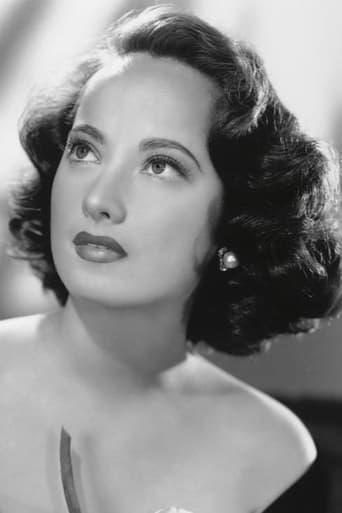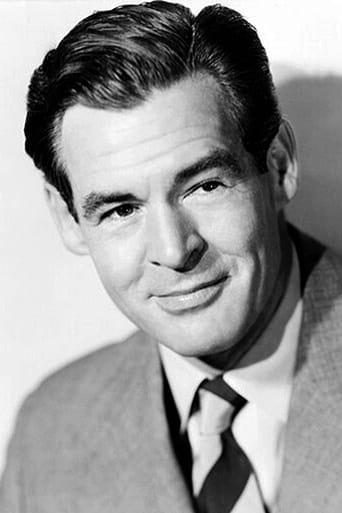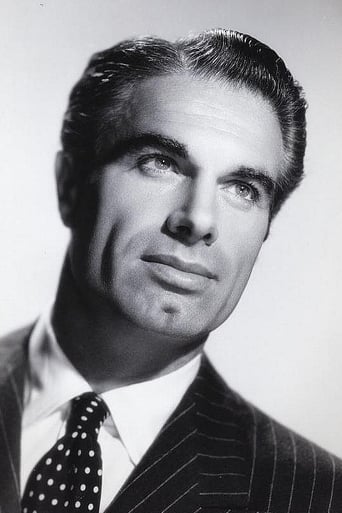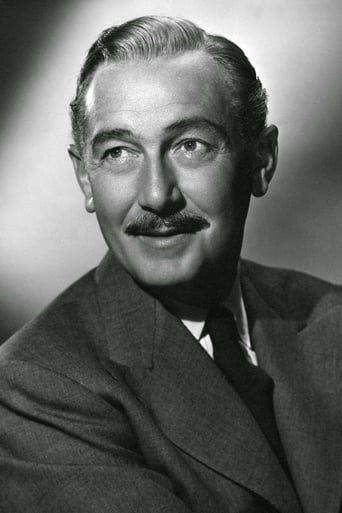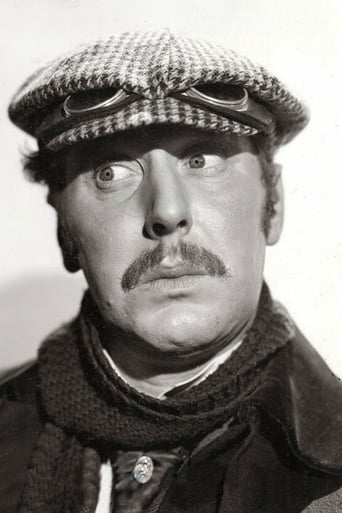VividSimon
Simply Perfect
Lucybespro
It is a performances centric movie
TrueHello
Fun premise, good actors, bad writing. This film seemed to have potential at the beginning but it quickly devolves into a trite action film. Ultimately it's very boring.
Gurlyndrobb
While it doesn't offer any answers, it both thrills and makes you think.
bensonmum2
Berlin Express is a mystery set shortly after WWII on an Army transport train headed from Paris to Berlin. The train carries an assortment of characters, all with different backgrounds and allegiances. The trip is sidetracked in Frankfurt after the attempted assassination and later kidnapping of a German named Paul Lukas. Lukas has the ideas and wherewithal to deliver a unified post-WWII Germany. Others, however, do not want to see this happen and would rather Germany remain divided. I know a lot of this may sound vague and incomplete, but I've probably already given away too much of the mystery as it is.Overall, I would describe Berlin Express as a nice, but never great, film. The movie opens with a voice-over narration that is absolutely necessary to set-up what's to come. These monologues can sometimes annoy me, but without it here, the film would have taken at least an additional hour to explain what was happening. The acting here is solid, but not necessarily spectacular. Robert Ryan and Merle Oberon head the talented United Nations-style cast. The mystery elements work in Berlin Express. Curt Siodmak is responsible for the twisted, sometimes confusing, but always engaging, screenplay. The big twist to the plot that comes near the 30 minute mark worked almost perfectly on me. It really caught me off guard. Most of the story is told in a documentary, matter-of-fact style that suits the somber surroundings. Speaking of the surroundings, the real star here are the locations. The movie was shot in the actual post-war ruins of Frankfurt. The bombed out building, the crumbling infrastructure, and the gut-wrenching homelessness are filmed magnificently. It's sad and horrific, but absolutely beautiful.
morrison-dylan-fan
Despite finding Valley of Hell and Carnival of Sinners to be extraordinary films by his dad Maurice,I for some reason have never got round to seeing a title from Jacques Tourneur.Taking a look at the TV listings,I was pleased to find that the BBC were doing a Jacques Tourneur double bill,which led to me getting on the express.The plot:Going on the Express train to Berlin,the passengers find themselves having to mix with other reps of nations occupying Germany. Mistrusting him due to him never coming out of his carriage,the group are surprised to find out that potential peace maker Dr. Bernhardt.Despite their side having recently lost,a secret Nazi blows up Bernhardt's carriage. Pushing for answers, Robert Lindley,finds out that the man was an impostor,and that Bernhardt and his secretary Lucienne were pretending to be fellow passengers. Believing that he has escaped the Nazi assassins, Bernhardt crosses paths with old friend Walther,who reveals to Bernhardt that he has not gotten off the tracks.View on the film:For the opening 30 minutes,director Jacques Tourneur & cinematographer Lucien Ballard (aka:the-then Mr Merle Oberon ) intercut their moody Noir espionage with startling footage of Berlin's "Russia zone." Given the unique chance of being the first Hollywood production shot in post-war Germany and the first movie to be allowed to film in Russia's "zone" Tourneur sadly lets the chance slip out of frame.Going for a tell and show approach, Tourneur clips the Film Noir anxiety by layering Paul Stewart's narration on thick,which does not add a psychological depth to what is being shown,but just describes the images!Stopping the narration once everyone is gathered, Tourneur walks in the shadows of war-torn Berlin and Frankfurt ,casting the shadows from the destroyed buildings down on the group attempting to rid the final Nazi gasps. Dancing in the underworld of the cities in seedy nightclubs, Tourneur explores every corner with sharp tracking shoots that follow Walther sinking into the post-WWII darkness. Calling out a sincere message of unity and understanding between the occupying nations,the screenplay by Harold Medford and Curt Siodmak avoid the message becoming sickly sweet, by placing it in a gang on a mission Film Noir. Brilliantly expressing the abrasive relationship between the occupying nations allegorically on the train, the writers whip up a Film Noir storm,as Dr. Bernhardt starts to regret giving lifelong friend Walther his trust.Although carrying a poor French accent, Merle Oberon gives a sparkling performance as Lucienne,who is given an enticing flirting side by Oberon,which mask her quick-witted Femme Fatale skills.Joined by a superb support cast that include Charles McGraw and a worn-down Reinhold Schünzel as Walther, Robert Ryan gives a great, chiselled performance as Lindley. Initially being firm- handed with his opinions,Ryan wonderfully brings an ease to Lindley,as he realises that he has to work with others to keep the Berlin Express on track.
JurorNumberThirteen
A very average film noir only made interesting as a piece of social history in its location filming around Berlin and Frankfurt. The documentary style voice over used a lot at the beginning of the filim I found irritating and the script and Miss Oberon's performance were poor. The rest of the leading players are average apart from the ever reliable Robert Coote playing his English toff. The images filmed in Germany were sobering to say the least. The portrayal of the distrust in Germans in 1948 and the scale of devastation of Berlin and Frankfurt compared to now was very quite shocking. My father was in Germany just after the war and was guarded when talking about his time there but was visibly upset when he talked about how tough it was just to exist in Germany at that time.
seymourblack-1
This spy thriller which is set in the period just after the end of World War 11, depicts in documentary-style, the level of devastation, turmoil and political intrigue that was prevalent in Germany at that time. An assassination, a kidnapping and the presence of a group of Nazi activists illustrate the type of dangers that had to be overcome in order to achieve a more peaceful future for the country and an atmosphere of mistrust and suspicion amongst the Allies did nothing to make this aspiration any easier.Shortly after a military train travelling from Paris to Berlin makes an unscheduled stop because of an obstruction on the line, an explosion in one of the compartments kills a passenger who the other travellers believe is Dr Heinrich Bernhardt. Dr Bernhardt, the German head of a fact-finding commission, had formulated a plan to unify his country and was on his way to an important conference in Berlin.When the train reaches Frankfurt, the passengers who were travelling in the same car as Bernhardt are taken in for questioning by a U.S. Army Colonel and it becomes apparent that the man who'd been killed was a decoy and that the passenger who'd called himself Otto Franzen was actually the real Bernhardt (Paul Lukas). A mysterious French lady called Lucienne Mirabeau (Merle Oberon) is also revealed to be Bernhardt's secretary.At Frankfurt station, before he's able to continue his journey, Dr Bernhardt is kidnapped and a desperate Lucienne pleads with some of the other passengers to help in the search for the missing diplomat. An American agricultural expert, Robert Lindley (Robert Ryan), English schoolteacher James Sterling (Robert Coote), French businessman Henri Perrot (Charles Korvin) and a Soviet Army Officer, Lt. Maxim Kiroshilov (Roman Toporow) are eventually persuaded to help.Lindley and Lucienne's search leads them to a bombed out brewery where Bernhardt is being held by a group of Nazis and they get involved in a shootout before being able to escape and continue their journey. Unfortunately for Bernhardt, yet another attempt is made on his life before the train finally reaches its destination.In typical docu-noir style, a voice-over is used to provide some exposition and also information about various important landmarks etc. The whole movie has a realistic feel and Lucien Ballard's location footage of the heavily bombed cities of Frankfurt and Berlin is extremely impressive and also very affecting.The rather strained atmosphere which existed amongst the passengers of different nationalities at the beginning of the journey is later replaced by a spirit of cooperation when individuals from the four allied countries symbolically work together to search for Bernhardt. This suggests a feeling of optimism for the future which is in line with the idealistic views of Dr Bernhardt. A more noirish aspect of the plot, however, is the misleading identities and motivations of the characters, especially early on in the action.Director Jacques Tourneur's work is exemplary throughout but an interesting technique that he uses at various junctures is to utilise windows to frame some important shots. Examples of this are the sequence during which the various train passengers are introduced, the footage which shows a number of the ruined buildings and also a scene during which Dr Bernhardt is attacked on the train."Berlin Express" is an interesting movie with a talented cast whose performances contribute strongly to the way in which the mood of a particular point in time is captured so convincingly.

